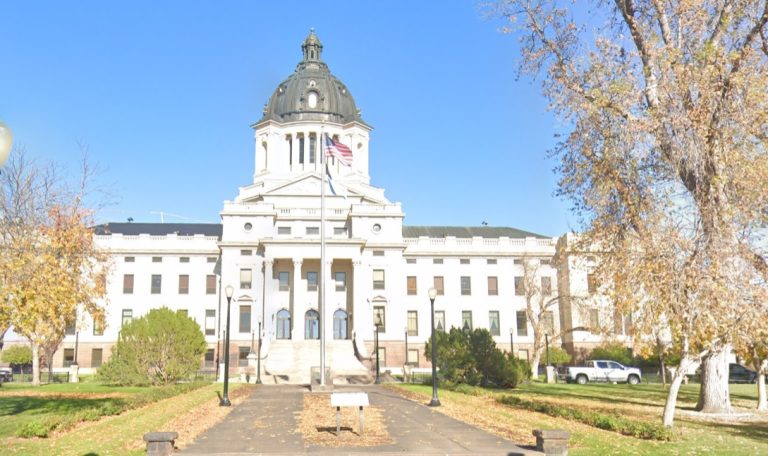PIERRE, S.D. (Joshua Haiar / South Dakota Searchlight) – A committee of South Dakota lawmakers expressed support Thursday for legislative efforts to rein in powers that some committee members said Republican former Gov. Kristi Noem abused.
The Legislature’s Government Operations and Audit Committee, which met at the Capitol in Pierre, endorsed draft legislation that would take a pool of economic development money known as the Future Fund out of the governor’s exclusive control.
Committee members also expressed informal support — but did not formally endorse — another bill draft that would tighten rules governing the use of state-issued credit cards.
Both ideas could become bills when legislators gather for their annual lawmaking session in January.
“This is trying to provide some more oversight and transparency,” said Sen. Taffy Howard, R-Rapid City, who serves as committee chair and introduced the bill drafts.
Future Fund
South Dakota employers pay a fee to the Future Fund when they submit payroll taxes to the unemployment benefits program. State law says the Future Fund must be used “for purposes related to research and economic development for the state.” Unlike other funds administered by the Governor’s Office of Economic Development, Future Fund expenses don’t go through a board of citizen appointees for vetting or approval. The governor has sole discretion to award Future Fund money.
Noem’s controversial uses of the Future Fund included $350,000 to pay for a fireworks show in 2020 at Mount Rushmore, $13.5 million toward the construction of a Rapid City-area shooting range that opened last week, $2.5 million to promote and conduct a Governor’s Cup rodeo in Sioux Falls, and up to $9 million on a workforce recruitment campaign that Noem starred in.
Legislators denied state funding for the shooting range before Noem awarded the Future Fund money.
“I think everyone remembers the fact that funding was denied for the new gun range, what was it – three or four times?” Howard said. “And lo and behold, Future Funds were given to complete that project, which, in my opinion, subverted the appropriations process.”
The bill draft, which the committee endorsed 7-1 with two members excused, would require each Future Fund grant to be approved by a majority of the Board of Economic Development, which already oversees other programs controlled by the governor’s office. The board’s members are appointed by the governor and confirmed by the state Senate.
The bill would also order the Governor’s Office of Economic Development to create rules establishing an application process for Future Fund loans and grants; the methods for assessing or estimating the economic impact that a project would have on the state; the criteria for determining how a project is selected for a loan or a grant; the process for setting an interest rate on a loan; any requirements that applicants must meet to be awarded a grant; and the process by which a loan or a grant is disbursed.
Credit cards
A Dakota Scout investigation earlier this year uncovered roughly $750,000 in charges to Noem’s state-issued credit cards over six years, including travel tied to a book tour and a Canadian hunting trip.
“I mean, the previous governor traveled to more than 30 states,” Howard said. “Places that you really had to wonder if every one of those was done on official state business. So, unfortunately, this is somewhat of a blowback because of previous actions.”
Noem resigned in January to become secretary of the federal Department of Homeland Security.
The bill addressing credit cards would direct the state Bureau of Finance and Management to write rules for how a state officer or employee can be issued a bank card, what criteria are used to assess that request, and maximum amounts for lodging, meals, transportation and other expenses charged. The bill would also establish a process to recover from an employee’s wages any spending above those caps.
Sen. Chris Karr, R-Sioux Falls, said the committee ran out of time Thursday, but he hopes to keep discussing the bill draft.
“I support the idea,” he said. “It needs to be workshopped a little bit.”
Karr voted in favor of the committee endorsing “the idea of” the bill, which Howard suggested following Karr’s comments. That motion passed 6-1, with three members excused.
Another of Howard’s drafts would have required that any expense incurred by the governor, in connection with state business conducted outside the state, must be reviewed by the State Board of Finance. That draft failed in a 5-3 vote, with two committee members excused. The motion needed a six-vote majority of the committee’s 10 members.
Sen. Ernie Otten, R-Tea, was the only member to vote against all three bill drafts. He did not explain his votes publicly.






